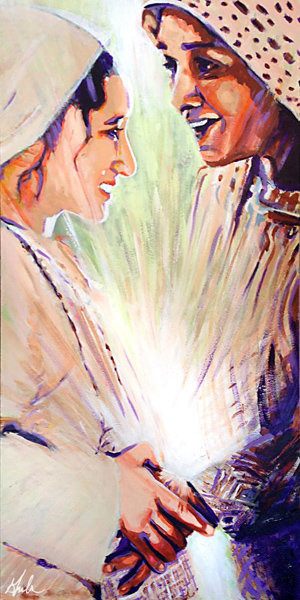For Sunday December 23, 2018
Lectionary Readings (Revised Common Lectionary, Year C)
Micah 5:2-5a
Psalm 80:1-7
Hebrews 10:5-10
Luke 1: 39-55
The angel Gabriel leaves, and Mary runs. "With haste," the Gospel writer tells us on this fourth Sunday in Advent, a newly pregnant teenager makes for the hills, not slowing down until she reaches the home of Elizabeth, her also-pregnant cousin. When her kinswoman welcomes her, she bursts into song — a song so subversive, governments twenty centuries later ban its public recitation.
I love this Gospel story. I love it because it's one of the rare narratives in the Bible that is female-centered. (The priest Zechariah — Elizabeth's husband, and the man-presumably-in-charge — is literally silenced throughout.) I love it because its setting is domestic, intimate, and earthy. But most of all, I love it because it allows me to view the mother of Jesus as a whole person. To view her, in Nadia Bolz Weber's language, "without sentimentality or cynicism."
This is no small achievement, because we (the Church) have buried Mary under so many layers of theology, piety, and politics, she's nearly impossible to excavate. Some of us pray to her. Others ignore her on monotheistic principle. Some call her "Theotokos," the God-bearer. Others champion her as a model of holy femininity — ever sinless, ever virgin, ever mother. To some, she is a child prophet extraordinaire. To others, the victim of divine manipulation.
Would the real Mary please stand up? Well, I think she has. I think Luke's account of the Visitation gives us a portrait of Mary that cuts through most of our assumptions and stereotypes. A nuanced portrait that balances fear with courage, doubt with faith, vulnerability with strength. Along the way, it gives us a portrait of ourselves — of what we, the Church, might become at our very best. Here, then, are three gifts I believe the Visitation story offers us for our Advent meditations.
The gift of community: As soon as Mary says "yes" to Gabriel's astonishing request, she goes "in haste" to see Elizabeth. She doesn't isolate herself. She doesn't keep God's revelation a secret. She doesn't play Lone Ranger and attempt to go it alone. Instead, she seeks out a fellow-traveler.
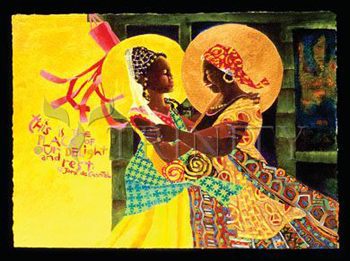 |
Although Luke doesn't elaborate on Mary's reasons for visiting Elizabeth, it's easy to imagine why a girl with a story as crazy-sounding as hers might make such an urgent journey. Tradition tells us that Mary is only thirteen or fourteen years old when the angel Gabriel appears to her. In her cultural and religious context, her pregnancy is a scandal. At best, it renders her an object of scornful gossip. At worst, it places her at risk of death by stoning.
Needless to say, she needs safety, affirmation, empathy, and companionship. She needs someone to recognize, nurture, deepen, and celebrate the work of God in her life. Someone who will receive, not reject. Love, not judge. Nourish, not condemn.
Could there possibly be a better job description for the Church? A better prototype for Christian community? What would it be like if we sought each other out with the trust and openness of Mary? What would it be like if we (like Elizabeth) received with tenderness the marginalized and vulnerable people who dare to come to us, seeking refuge and nurture? What would it be like if our communal worship echoed the full-throated call-and-response of these two kinswomen who find themselves caught up in God's bold, risky, world-changing work, and decide to find strength in each other's company?
In this Gospel story, Luke essentially describes the first Christian worship service in history. Mary and Elizabeth — the young and the old, the unmarried and the married, the socially established and the socially vulnerable — finding common ground in their love for Jesus. As Henri Nouwen describes it, "God's most radical intervention into history was listened to and received in community." What a gorgeous and challenging example for us to live up to.
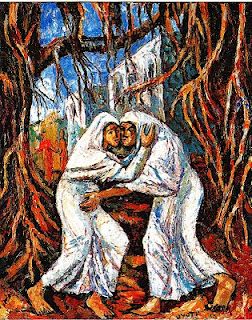 |
The gift of blessing: Part of what's so challenging about Mary's story is its brevity. We know from the Gospel accounts that she's perplexed by Gabriel's announcement. We also know that she says yes to the angel's request, anyway. But so much lies hidden beneath that seemingly quick and simple "yes." So many questions. So many possibilities. So many occasions for doubt. Again, Luke doesn't elaborate, but I can well imagine the questions I'd ask if I were in Mary's place: Is Joseph going to stick around? Will my parents still love me? How will I survive the pain of childbirth? Who will help me when my time comes to deliver? Who will support this baby if my fiancé bails? Who am I to raise the son of God? Is any of this for real, or am I losing my mind?
Into this maelstrom of questions comes an outpouring of blessing: "Blessed are you among women," Elizabeth tells Mary, "and blessed is the fruit of your womb." "Blessed is she who believed that there would be a fulfillment of what was spoken to her by the Lord."
Elizabeth astutely connects the dots in Mary's story; she makes the connection between trust and blessing. In Elizabeth's mind, Mary's "favored" status has nothing to do with wealth, health, comfort, or ease. Her blessing lies solely in her willingness to trust God and to surrender to God's will. To lean hard into God's promises and believe that they will sustain her, no matter what.
I wonder how desperately Mary needs this blessing by the time she lands on Elizabeth's doorstep, exhausted and scared. How badly she needs someone to remind her that even after the angel leaves, the light fades, and the vision recedes, God's faithfulness remains.
My guess is, Mary carries Elizabeth's blessing in her heart for the rest of her life. After all, her vocation as Jesus's mother is not easy. It leads her straight from scandal to danger to trauma to devastation. How blessed can she feel when she delivers her firstborn in a smelly stable? When she becomes a refugee, fleeing to Egypt to prevent her son's murder? What does blessing feel like for her years later, when her miraculously conceived child is arrested? Beaten? Mocked? Killed?
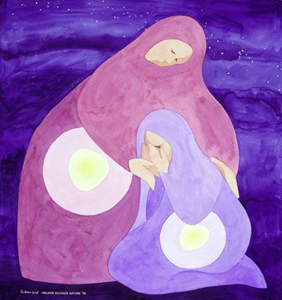 |
God's call on Mary's life requires her to be profoundly courageous and countercultural, to trust an inner vision few others understand or value. Elizabeth recognizes that Mary's faith is precious — that faith alone will fuel the ongoing surrender Mary's journey will require. So she names and blesses Mary's capacity for deep trust as a gift worth cherishing.
We don't live in a time or culture that encourages us to bless one another, and that's a terrible shame. What would it be like to recover Elizabeth's vocation of blessing? To cultivate spiritual attentiveness? To gaze long and deeply at each other, looking for glimpses of God? How would our churches change if we made a point of discerning, naming, and blessing the divine gifts we see in each other? Elizabeth "exclaims with a loud cry" when she recognizes God's life-changing work in Mary. What a compelling image. Joy flourishes when we're willing to humbly bless each other.
The gift of hope: Once Mary receives both community and blessing, she finds her prophetic voice. At the end of our Gospel reading, she bursts into song. Not just any song, but a radical, hope-drenched song that soars with promise for the world's poor, brokenhearted, and oppressed. Dietrich Bonhoeffer describes the Magnificat this way: "It is at once the most passionate, the wildest, one might even say the most revolutionary Advent hymn ever sung. This is not the gentle, tender, dreamy Mary whom we sometimes see in paintings.... This song has none of the sweet, nostalgic, or even playful tones of some of our Christmas carols. It is instead a hard, strong, inexorable song about the power of God and the powerlessness of humankind."
"My soul magnifies the Lord," Mary sings, and then her song goes on to do just that. To make more visible and clear — to magnify for the world — a God invested in revolutionary and lasting change for his creation. Mary describes a reality in which our sinful and unjust status quo is gorgeously reversed: the proud are scattered and the humble honored. The hungry are fed and the rich sent away. The powerful are brought down, and the lowly are lifted up. Mary describes a world reordered and renewed — a world so beautifully characterized by love and justice, only the Christ she carries in her womb can birth it into being.
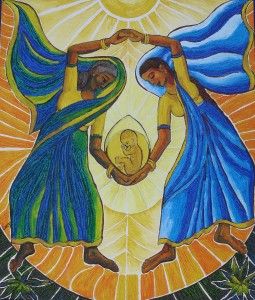 |
As I mentioned at the beginning of this essay, Mary's song is so subversive in its cultural, socioeconomic and political implications, it has been banned many times in modern history. When the British ruled India, the Magnificat was prohibited from being sung in churches. Similarly, during the "Dirty War" in Argentina, after the mothers of disappeared children postered the capital plaza with the words of the Magnificat, the military junta banned all public displays of the song. Too much hope, they decided, is a dangerous thing.
But "too much hope" is precisely what we're called to cultivate and proclaim on this fourth and final Sunday in Advent. The Messiah is almost here, Mary tells us, and the promise of his lasting reign changes everything. There is no unjust system, oppressive hierarchy, or arrogant leadership structure that God will not upend. No promise God will fail to keep. No broken, exploited life God will not save. So find your voice and sing your song — and share it with the world. What does your Magnificat sound like? How is God magnified through your unique perspective and vision? What words have you found to express the radical, revolutionary hope of the Messiah you carry?
I want to close this essay with a poem by Jan Richardson, about the Visitation. As we come to the end of this Advent season, may her words encourage you to receive and share the gifts of community, blessing, and hope. The Messiah is coming! So make haste. Be blessed. And magnify the Lord.
A Blessing Called Sanctuary
You hardly knew
how hungry you were
to be gathered in,
to receive the welcome
that invited you to enter
entirely—
nothing of you
found foreign or strange,
nothing of your life
that you were asked
to leave behind
or to carry in silence
or in shame.
Tentative steps
became settling in,
leaning into the blessing
that enfolded you,
taking your place
in the circle
that stunned you
with its unimagined grace.You began to breathe again,
to move without fear,
to speak with abandon
the words you carried
in your bones,
that echoed in your being.You learned to sing.
But the deal with this blessing
is that it will not leave you alone,
will not let you linger
in safety,
in stasis.The time will come
when this blessing
will ask you to leave,
not because it has tired of you
but because it desires for you
to become the sanctuary
that you have found--
to speak your word
into the world,
to tell what you have heard
with your own ears,
seen with your own eyes,
known in your own heart:that you are beloved,
precious child of God,
beautiful to behold,
and you are welcome
and more than welcome
here.
Image credits: (1) TrinityStores.com; (2) Silvepura.blogspot.com; (3) St. Gertrude Monastery; (4) Hanna Strack; and (5) FineArtAmerica.com.

